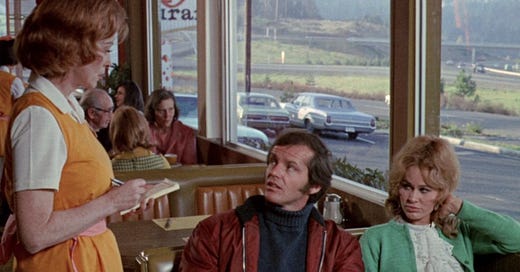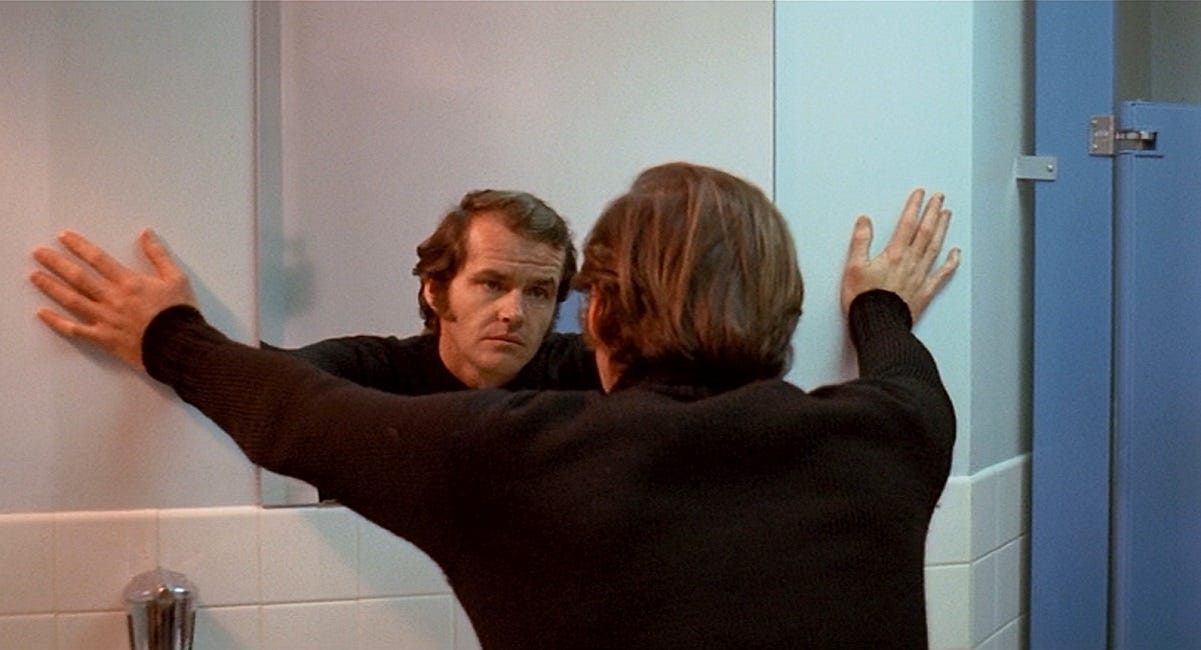This week's double feature has been split due to length. Another Round was published on 1/6.
“If a person has no love for himself, no respect for himself, no love of his friends, family, work, something - how can he ask for love in return? I mean, why should he ask for it?”
Five Easy Pieces, Bob Rafelson’s 1970 character piece, follows Bobby Dupea (Jack Nicholson), an upper-crust piano prodigy who’s dropped everything to live as an average roughneck working the oil fields. He moves around a lot and starts the film shacked up with his waitress girlfriend Rayette (the incredible Karen Black) in the deserts of California. He drinks cases in bowling alley parking lots and has fiery flings with whoever finds him interesting. He’s vacationing among the poor, tasting their fares and flirting with their locals.
But he can’t even help himself from sneering at those around him at the bottom. He rolls his eyes at Rayette’s dreams of being a country singer and berates his drinking buddy for living in a trailer park. In one of the most famous scenes in 70s cinema, Bobby hurls his lunch at a waitress after repeatedly being told “no substitutions” on the menu.1 Sure the scene is hilarious, and carries with it the rail-against-the-system anger of the time, but it shows how little Bobby actually cares for the working class – let alone remaining anonymous. For someone who shunned themselves from the limelight, he’s despondent whenever left alone with his thoughts.
The high life doesn’t sit right either. When he’s called back to Puget Sound after his father suffers two strokes, he arrives at a woodland estate frozen in time.2 A perfect reminder of all he’s given up. His father is frozen as well, having been left in a vegetative state – a sunken stare is his only response to his children at the dining table. Bobby’s younger sister is a sweetheart wracked by nerves, while his older brother is a pompous buffoon; a true representation of how Bobby views the elite – brittle, clueless, and condescending. His brother’s academic friends treat Rayette like some southern dog that can talk, but fawn over Bobby because they know he’s “talented.”
However, his brother’s beautiful fiancée Catherine (Susan Anspach, with a piercing performance) gives him enough reason to stay, as he tries every crass line and base flirtation to seduce her. The thing is, all she wants is to hear him play. The diner scene may be what has stood the test of time in the cultural mind, but Catherine’s simple request of “Robert, would you play for me?” is the true masterwork at the center of this film.3 Bobby sits down, and as he begins to play Chopin’s “Prelude in E Minor”, the camera glides across the walls of the study. Pictures hang spanning generations of musicians, the cold eyes of old money, his sister, his brother, himself, and finally – his father. Bobby Dupea is a character of immense contradiction, but in this room, he could never be more simple to understand.
To speak candidly, Five Easy Pieces is one of my favorite films ever made – and I’m very afraid that I’ve made it sound drab and haughty, but it’s not! It’s tender, it’s surprising, it’s funny as all hell and achingly beautiful. There’s a novelistic quality that Rafelson has accomplished here, reminding me of two other masters: Hayao Miyazaki and Jim Harrison. Miyazaki, the legendary animator known for My Neighbor Totoro and Spirited Away, begins his movies with story boards. Hand drawn animation is a time consuming task, so Miyazaki must begin before a script is even written. This beginning without an end creates the naturalistic and surprising paths of his films, not due to any cheap twists, but due to the fact that life itself has no predetermined ending. In Pieces, there is no clear clue of where the movie will go.4 Tonal shifts and surprises flow naturally, like a river that hides itself until you round the bend.
As for Jim Harrison, a titan of poetry and prose, the relation is immediately apparent.5 Pieces feels like an adaptation of some lost Harrison novel. His characters are thoughtful laborers of the natural world, or broken academics lost within their own vices. It’s remarkably easy to imagine most Harrison protagonists waking up hungover along the pier as Bobby does. Familial history is a central function as well. Harrison’s most well known book, Dalva, follows a woman searching for her relinquished son. Yet, across the novel we look back at everything from her grandfather’s failed art career to her ancestors at Wounded Knee. Every decision she makes spirals out of this storied past – just as Bobby cannot escape the pictures on the piano room wall. Both works are remarkable in how they depict history’s long shadow over our agency. No decision is free from the countless made before us.
Pieces’ weaves in surprising ways, but Bobby is a creature of habit. From classical wunderkind to Las Vegas session musician to oil worker to the next thing. He’s followed by such an endless history of disappointments, both real and imagined, and his answer to each one simply seems to be a jump further down the ladder. Late in the film, Bobby uses his father’s silence as an opportunity to talk. “I move around a lot,” he explains. “Not because I’m looking for anything really. I’m getting away from things that get bad if I stay.”
Roger Ebert called films “machine[s] that generates empathy,” and no more so does that ring true as Pieces’ suddenly arrives at it’s ending. Bobby is selfish and cruel, but how many times can we watch someone act this way before our hearts open to them? He can’t ask for our love, but he has it anyway. Because in the numb silence of that never-ending final shot, Bobby Dupea is simple to understand.
Five Easy Pieces is available to rent via Amazon, iTunes, and most other streaming platforms.
Special thanks to Austin Smoldt-Sáenz, Elena Bruess, Joshua De Lanoit, and Max Seifert.
The behind the scenes interview with Rafelson and Nicholson is well worth a watch, if only to hear Nicholson drawl out the word “Poopy’s.”
The road trip to Washington is a strange and hilarious detour, as Bobby and Rayette pick up two hitchhikers along the way. Two worn out hippies who can’t shut the hell up about how they find humans disgusting. It’s nails on a chalkboard for Bobby, when really he’s just looking in a flower-power mirror.
Susan Anspach delivers a true hall of fame line delivery here. A masterclass of both romance, and expectation.
It takes a good twenty minutes before Bobby even plays a piano.
In a movie chock-full of daddy issues, it’s only fitting I bring up my dad’s (now my) favorite author. Any fan of Schlub Cinema should secure a copy of Brown Dog immediately from your local bookstore or library.





